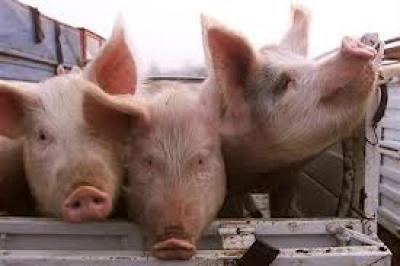Christians, there is everything wrong with eating meat

This is a response to Vijay Jayaraj’s recent op-ed titled, “Christians, there is nothing wrong with eating meat.”
Christians have a long-standing history of not supporting social justice. For instance, many Christians cited the Bible to justify slavery before and during the Civil War. Similarly, many Christians have and still do cite Scripture to support the oppression of women. Likewise, Christians have a long history of using the Bible to justify harm against animals. Jayaraj’s published article continues this spirit of callousness.
I wasn’t surprised by the information presented because Vijay cited the book, What Would Jesus Really Eat? The Biblical Case for Eating Meat. Jayaraj may or may not be aware that the Animal Agriculture Alliance partially funded the book publishing.
Now I’ll focus on debunking the claims. Vijay states, “God, since the beginning of creation, had no problems with meat consumption.” This claim is false.
At the beginning of creation, God created animals and humans and told them to eat only a plant-based vegan diet (Genesis 1:20–30). In Genesis 2:19–20, God encouraged Adam to name the animals, and Adam complied. This identification was not by taxonomy or scientific classification but like how we give names to our companion animals at home. For instance, Jesus dubbed Simon “Peter” (John 1:42). Thus, naming indicates friendship and significance. Therefore, animals were created to be friends, not food. God originally created the world to be a vegan paradise, where humans took care of the animals (Genesis 1:20–2:20). There was no death, disease, or even animal exploitation in Eden. But then sin entered the world (Romans 5:12).
The first time God allows meat consumption (Genesis 9:1–4) occurs long after humanity was expelled from the paradise of Eden. However, this meat consumption is only tolerated after humans were said to have hearts of “evil intention” (8:20–21). This allowance of meat (9:3–4) comes with a curse and a restriction (9:2,4). This situation is much different from the beginning of creation when God said that the plant-based vegan diet was “very good” (1:29–31). Eating meat parallels another morally questionable action God tolerates to cope with sin.
Jesus said in Matthew 19:8 about divorce, “Because of your hardness of heart Moses allowed you to divorce your wives, but from the beginning, it was not so.” In other words, God’s ideal is for couples to have an inseparable marriage (Genesis 2:24). Yet, God tolerates divorce (Matthew 19:9) because Christians may not be able to live up to his highest ideal in this sin-drenched world. Therefore, Christians should always aim for God’s highest ideal and discourage divorce.
Similarly, Christians should always strive for nonviolence in their food choices and discourage meat. God showed this by punishing the people who ate meat while being provided heavenly bread (Numbers 11:4–34). Paul and Sosthenes (1 Corinthians 1:1) cite this incident when addressing believers about eating meat that had been sacrificed to idols/demons (10:3–29). Because Christians are not following the ideal, animal flesh has become extremely problematic for our world.
People in biblical times rarely ate meat. In contrast, today, most people in industrialized nations eat it three times a day, every day, all year round. This gluttonous demand for meat (Proverbs 23:20–21) is why more than 70 billion land animals are slaughtered annually for food. In addition, greater than 90% of globally farmed animals and about 99% of farmed animals in the United States are reared in what is known as “factory farming.” The animals are the ones that suffer the most. Factory farming involves closely confining animals indoors and cutting the tails off of sheep, cows, and pigs, normally without anesthetics. Similarly, chickens have their beaks partly seared off. There is no question this ghastly nightmare is animal cruelty, which is condemned in Proverbs 12:10.
The Bible condemns environmental destruction (Numbers 35:33–34; Jeremiah 2:7) and encourages humanity to be good caretakers of the land (Genesis 2:15). These numerous factory-farmed animals create massive amounts of feces, which causes air and water pollution, as well as food contamination. Meat affects humans in other ways. Factory-farmed animals are frequently given antibiotics to prevent infections. This practice is linked to antibiotic resistance. Similarly, meat is connected to pandemics. Many of the worst infections humanity encounters derive from the exploitation of animals for food. For instance, HIV is believed to have originated from humans eating infected chimpanzees.Bird and swine flu are linked to factory farming. Finally, meat is connected to climate change, as farmed animals and their byproducts produce at least 51% of total global greenhouse gas emissions.
Jayaraj cites Romans 14 to say that Christians should see no problem with eating meat. Yet, Vijay seems to have missed the context, as this passage is about meat from animals sacrificed to idols. This issue is clarified in 1 Corinthians 8:1–13. In idol temples, animals were sacrificed to pagan gods, and the leftover meat was sold at the markets. The early church had debated whether Christians should eat this meat, as it may be associated with idolatry. If Jayaraj knew the context, Romans 14 is a poor application to today’s situation because the meat in those times did not come from intensive factory farming, which is tremendously cruel to animals and harmful to humans. Additionally, people in ancient times did not have access to the abundance of food that most do today. Importantly, Romans 14 is not addressing the ethics of meat but rather the possible idolatry associated with animal flesh.
Jayaraj cited that the disciples were fishermen. They were, but after they met Jesus, they became “fishers of men” (Matthew 4:18–22). Finally, Vijay states that Jesus ate meat. Luke 24:41–43 is the only passage indicating that Jesus ate meat (specifically fish). However, our food supply is a lot different than when Jesus lived. Today we have restaurants on every corner, refrigerators, and 24/7 supermarkets. With so much abundance, would Jesus eat meat today?
Plus, it's possible Jesus did not eat meat. It depends on the translation. For instance, Luke 24:41–43 NKJV leaves a question open as to whether Jesus ate fish or honeycomb.
Regardless, Jesus won’t be eating animal flesh when he returns because he will remake a vegan paradise, where humans and animals will live in peace and harmony for all eternity on the New Earth (Isaiah 11:6–9, 65:17–25). The New Earth will be just like Eden (51:3), with no death (Revelation 21:4) and, thus, no meat. Jesus told us to pray for our cursed world to look like that heavenly world (Matthew 6:9–10). Also, 2 Peter 3:11–13 tells us to help do our part to bring that righteous world here and now. In conclusion, if Jesus was walking around today, I think he would agree that for Christians, there is everything wrong with eating meat.
Due to space, I could not fully address the issues of the kosher laws. However, I discuss them in my upcoming book.
Matthew King is the President and co-founder of the Christian Animal Rights Association



























